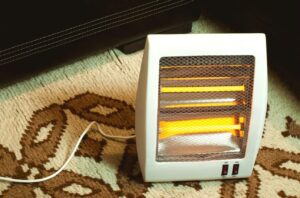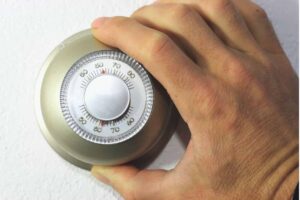As we move into the spring season, temperatures gradually begin to rise. As a result, homeowners must adjust their heating systems to ensure efficient energy consumption.
Leaving the heat on too long can lead to excessive energy consumption, strain on the heating system, higher energy bills, and a negative environmental impact. Therefore, it is essential to know when to turn off the heating system during the spring season.
However, knowing the right time to do so can be challenging. This blog provides essential indicators to help you determine when it is time to turn the heat off and the necessary steps to take to do so.
Benefits of Turning The Heat Off:
 Save Energy
Save Energy
Turning off the heating system is a simple yet effective way to reduce energy consumption, promote sustainable energy sources, and encourage energy-efficient practices.
According to the International Energy Agency (IEA), heating systems consume almost half of the global energy demand, significantly contributing to greenhouse gas emissions. The IEA also reports that up to 30% of energy consumption for heating purposes is wasted due to inefficient systems or excessive heating.
By turning the heat off when it is not needed, homeowners can contribute towards reducing energy waste and carbon emissions.
Save Money on Energy Bills
Heating systems contribute significantly to energy bills, representing approximately 29% of household utility costs. Therefore, turning the heat off when not needed, such as when you and the family are at work or school, can significantly reduce energy consumption and lower energy bills.
In addition, by implementing a whole-house systems approach, homeowners can properly insulate their homes, use programmable thermostats, and maintain heating systems to maximize energy efficiency.
Lessen The Strain on Your Heating System
When a heating system is left running continuously, it can cause significant strain on the system, leading to wear and tear and a shorter lifespan. Furthermore, when a heating system is running, it must work harder to maintain a consistent temperature, which can further strain the system.
Turning off the heating system when it is not needed can help alleviate this strain, ultimately leading to a more efficient and effective system.
Key Indicators That You Should Shut Your Heater Off
Shutting off the heater varies depending on the person’s home, the climate of the area, and typical weather patterns. Here are some key indicators to look for that can help you determine when to turn off the heater.
Consistently Warm Out
Keeping the heater on when the weather is warmer than 60 degrees can create an uncomfortably warm and stuffy home. This may be a key indicator when it is time to turn the heat off. With increasingly warm days, there is no longer a need for heat.
 Only Using The Heating At Night
Only Using The Heating At Night
If someone only uses the heater at night, it may be a sign that it is time to turn the heat off completely for the season. In this case, turn off the heater during the day and use alternative forms of heating such as blankets, sweaters, or space heaters. These steps can significantly reduce energy consumption and save on energy bills.
Your Area’s Climate
The climate of the area and typical weather patterns may also affect the decision to turn off the heater at night. In colder climates, you may need to use the heater for a longer duration to maintain a comfortable indoor temperature.
Typically in the Pittsburgh area, most people use their heaters until February into March, but with the beautiful weather this year, some may have already turned off their heating systems for the season.
How To Turn Off Your Heater:

It is crucial to follow the proper steps to ensure it is safely and effectively shut down. By taking these steps, you can save on energy bills and extend your heating system’s lifespan.
- Adjust the thermostat to the setting with the lowest temperature possible.
- Listen carefully to confirm that the heating cycle has ended and that no heating system element is still operational.
- Switch off the power of the heating system by setting the power switch to the “OFF” position.
- Close the supply valve feeding the pilot light to ensure fuel does not reach it.
- Turn off the valve that supplies fuel from the tank.
If you need help with this process, then don’t hesitate to reach out to your local HVAC professionals. Spurk HVAC would love to offer a helping hand.
End Note
Turning off the heating system when unnecessary offers numerous benefits, including saving energy, reducing energy bills, and lessening the strain on your heating system. Although the right time to shut off the heater varies, some key indicators, such as consistent temperatures above 60 degrees, using the heater only at night, and the climate of your area can help you determine when to turn off your heater. If you need help shutting your heater off for the season, heating systems installation, or maintenance, contact Spurk HVAC. To learn about our services, please click here.




 Save Energy
Save Energy  Only Using The Heating At Night
Only Using The Heating At Night



